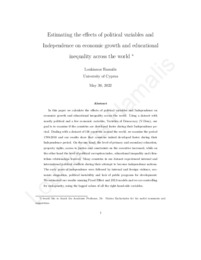Estimating the political variables and Independence on economic growth and educational inequality across the world

View/
Date
2022-05-13Author
Hamalis, LoukianosPublisher
Πανεπιστήμιο Κύπρου, Σχολή Οικονομικών Επιστημών και Διοίκησης / University of Cyprus, Faculty of Economics and ManagementPlace of publication
CyprusGoogle Scholar check
Keyword(s):
Metadata
Show full item recordAbstract
In this paper we calculate the effects of political variables and Independence on economic growth and educational inequality across the world. Using a dataset with mostly political and a few economic variables, Varieties of Democracy (V-Dem), our goal is to examine if the countries are developed faster during their Independence pe riod. Dealing with a dataset of 136 countries around the world, we examine the period 1789-2018 and our results show that countries indeed developed faster during their
Independence period. On the one hand, the level of primary and secondary education, property rights, access to justice and constraints on the executive increased, while on the other hand the level of political corruption index, educational inequality and clien telism relationships lowered. Many countries in our dataset experienced internal and international political conflicts during their attempt to become independence nations. The early years of independence were followed by internal and foreign violence, eco nomic stagnation, political instability and lack of public programs for development.We estimated our results running Fixed Effect and 2SLS models and we are controlling for endogeneity, using the lagged values of all the right-hand-side variables.
Collections
Cite as
The following license files are associated with this item:

